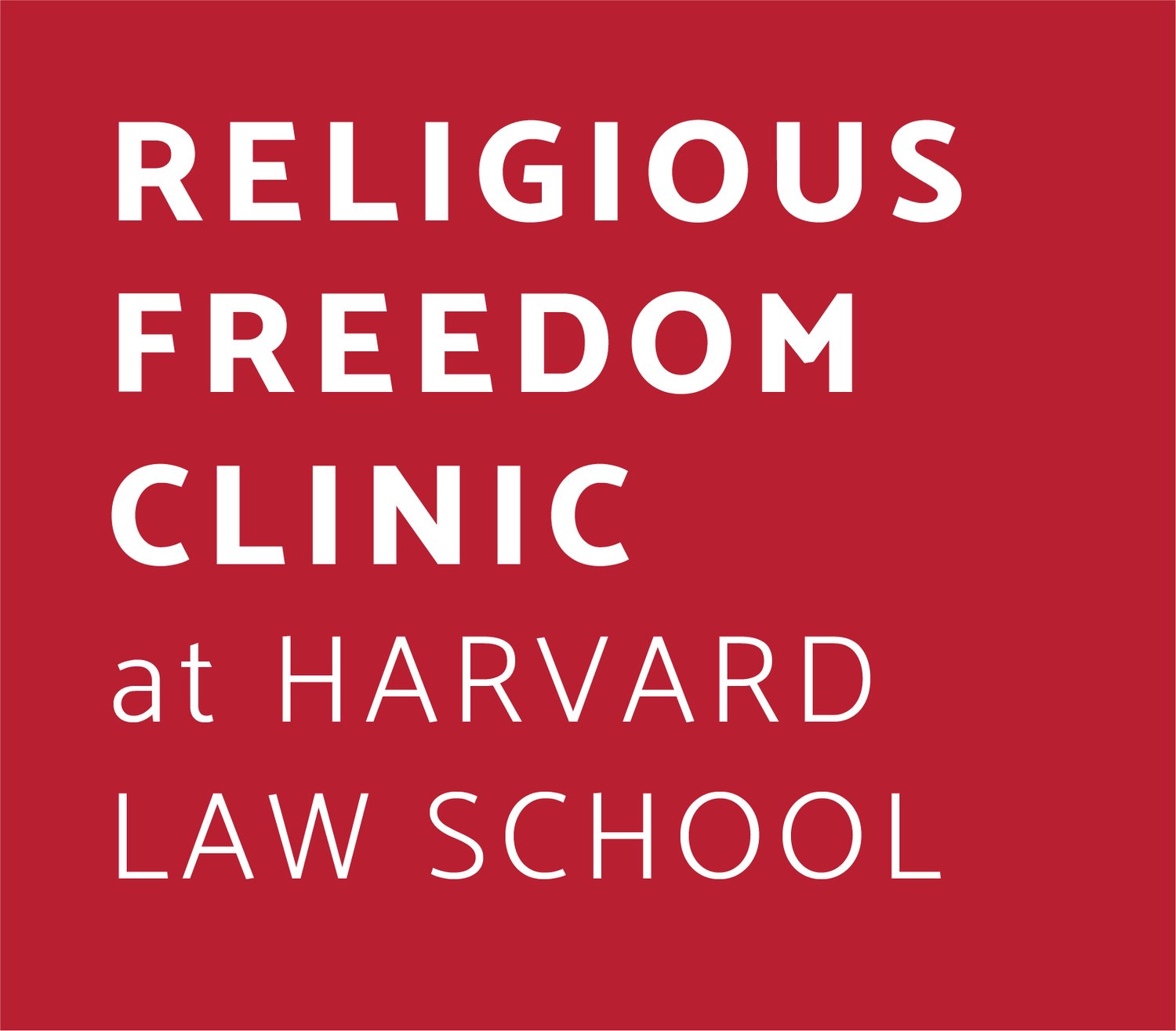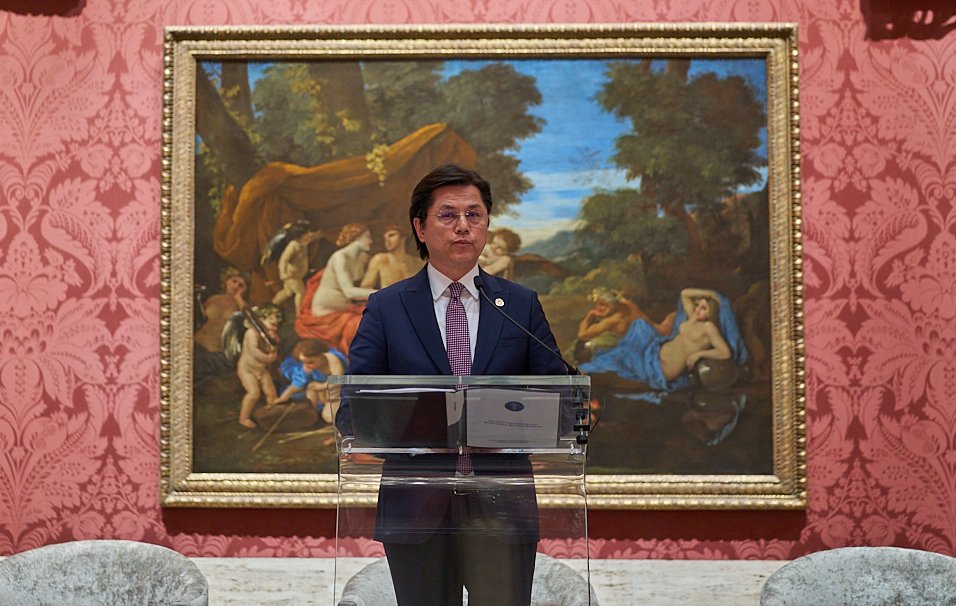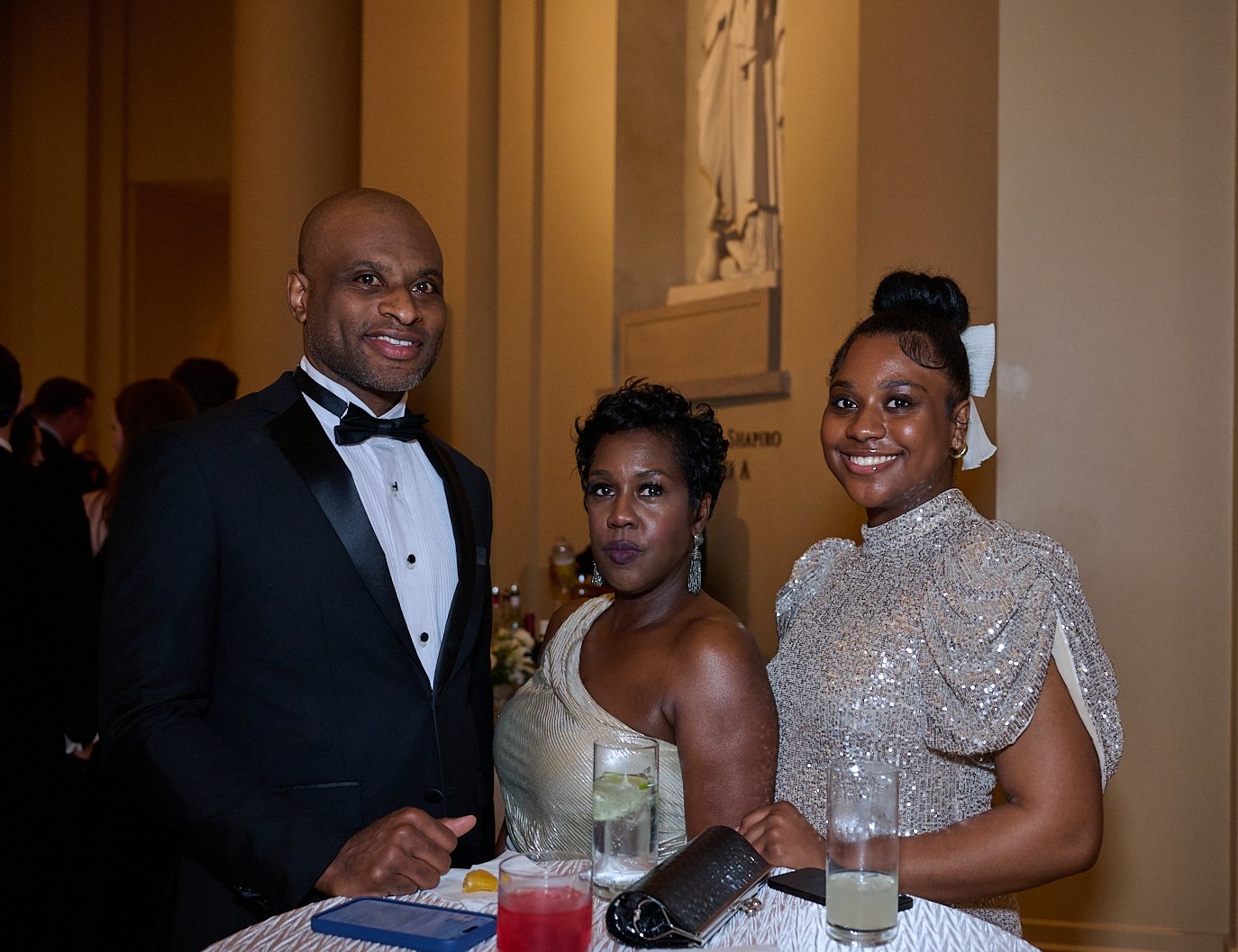Religious Freedom Gala
Museum of Fine Arts, Boston, Massachusetts | April 11, 2024
On the evening of April 11, 2024, guests of the Religious Freedom Clinic at Harvard Law School gathered at the Boston Museum of Fine Arts for a cocktail reception in the Shapiro Rotunda and Colonnade before moving to the Koch Gallery for the Gala Dinner. The event began with an invocation by Rabbi Eli Goodman, the head rabbi of Chabad Lubavitch of the Beaches, whom the Clinic has represented in federal court litigation in New York. Rabbi Goodman’s invocation was followed by remarks from Professor McDaniel and Nury Turkel, Chair of the U.S. Commission on International Religious Freedom, who addressed the plight of Uyghur Muslims in China. The evening closed with a fireside chat with Judge John K. Bush, Professor Ruth Okediji, and retired Judge Thomas Griffith.
Invocation
Rabbi Eli Goodman, Head Rabbi of Chabad Lubavitch of the Beaches, Long Beach, New York
Rabbi Goodman opened the evening’s festivities at the Gala Dinner hosted at the Boston Museum of Fine Arts with the invitation that tradition
“teaches us that every individual is created in divine image, imbued with inherent dignity and worth.”
He continued,
“With this understanding we are called to defend the rights of people to worship freely and to express their beliefs without fear of persecution of discrimination.”
He united the attendees by expressing mutual support centered around the Religious Freedom Clinic at Harvard Law School and invited all to
“be inspired by the teachings of our faith… [that] our efforts tonight be guided by compassion and righteousness as we strive to ensure that religious liberty remains the cornerstone of our society.”
Opening Remarks
Given by Religious Freedom Clinic Director, Professor Josh McDaniel.
In opening remarks, Professor Josh McDaniel highlighted the “common thread” of the symposium’s panels of scholars, advocates, and experts—“that, at its core, religious freedom for all is essential to human dignity and flourishing, and that it is imperative that we find ways to build bridges of understanding around the idea of religious freedom.”
“This,” he added, “is a project the Religious Freedom Clinic at Harvard Law School is committed to. We bring together students from diverse backgrounds, faiths, and perspectives and we rally around the cause of our clients to help the marginalized and oppressed obtain justice and accommodation.”
In doing so, he concluded, the Clinic’s students “confront some of the most difficult questions, questions that cut to the core of what it means to believe in pluralism, what it means to serve and assist the needy, what it means to provide access to justice, and for many students, what it means to be a better Jew, Christian, Muslim, Sikh, or even just a better human.”
Remarks
Commissioner Turkel delivered sobering remarks on China’s use of artificial intelligence to oppress religious minorities. “There is no better example of the horrific human rights abuses technology can enable than the Uyghur homeland,” Turkel said. “Chinese security has rounded up as many as 3 million Uyghurs and other Turkic Muslims and placed them in modern-day concentration camps.” The police, Turkel said, “were following orders that had been pre-programmed by an A.I. algorithm. The offenses can sound almost cartoonish, ranging from having a long beard to having WhatsApp on their phone, to using the front door more often than the back door, or reciting the Quran during a funeral.” The threat is not just arrest. “Once people become used to the fact that somebody is always watching them, the technology becomes almost unnecessary. People feel they are constantly being watched and automatically censor themselves. It is behavioral engineering on a massive scale.” Turkel cautioned that China is spreading its surveillance technology beyond its borders, reaching even the United States, and called for urgent action to counter this trend. “We must recognize the darkness we are fighting against in order to create a world in which religious liberty flourishes.”
Given by Nury Turkel, Commissioner and former Chairmas of the United States Commission on International Religious Freedom.
Fireside Chat
Professor Okediji’s first question opened the discussion centered around the growing importance for protecting religious freedom. Judges Bush and Griffith emphasized how moral goods, like humility, respect, and integrity, lead to reconciliation between differing religions. For the judiciary, Judge Bush noted, “A respect for persons of faith is vital in order to understand where a person is coming from. Their views are important, and our system of government is designed that people are free to have these freedoms even if they aren’t ones you understand.” Failing to respect others undercuts the possibility of understanding others. Judge Griffith responded that “the Creator has endowed us with rights... and this country has recognized that. I can’t think of any right that is more important than the right to worship the Creator who has endowed us with those rights. To me, protecting religious liberty is as fundamental as anything we do.” He emphasized that people of faith are responsible for exemplifying that “religion is an act of reconciliation."
Professor Okediji turned to the phenomenon of religious clinics at institutions like Harvard Law School. While introducing faith into secular institutions could come as a surprise to some, Judge Bush identified it as a response to the “assault on religious freedom. Protecting it is now a need.” Judge Bush continued, adding that faith and religion “are shared by a lot of people” and, as a result, it is crucial to defend religious belief and practice as an inherent right that “protects and promotes diversity” in the United States.
In her final question, Professor Okediji zeroed in on the work of religious freedom clinics, asking Judges Bush and Griffith “What do you think is the most important lesson for our religious liberty clinics and the work that they do?” Judge Griffith stressed the importance of focusing on the innate value of the individual, quoting C.S. Lewis’s observation that “your neighbor is the holiest object presented to your senses.” Judge Bush concluded by encouraging the Clinic’s students that their “work is tangible and effective, as your involvement in cases catches the attention of judges and opens doors for furthering religious freedom.”
With a sense of hope and inspiration, the fireside chat concluded.
Between Professor Ruth Okediji, the Jeremiah Smith Jr. Professor of Law at of Harvard Law School, Honorable John K. Bush, Circuit Judge on the United States Court of Appeals for the Sixth Circuit, and Honorable Thomas Griffith, retired Circuit Judge on the United States Court of Appeals for the D.C. Circuit, gathered for a fireside chat meant to elucidate the duty of United States judges and the intersection between law and religion.
Closing Benediction
Pastor Alex Smith joined by his family
Alex Smith, a client of the Religious Freedom Clinic, attended the Gala accompanied by his wife and daughter, and offered a benediction to conclude the event. Born and raised in Atlantic City, New Jersey, Alex prioritizes his community, finding ways to bring life and safety through his vocation as a pastor of a local church and his occupation as a mask technician for the city’s fire department. As a devout Christian and community leader, he believes he has a biblical obligation to wear a beard. When the city denied his request and dismissed his case, he did not know where to turn or if he should
“continue to fight or ... throw in the towel and give up the fight.”
Until, he said, with relief and gratitude in his voice,
“Lo and behold, I received an email and phone call from organizations called First Liberty Institute and the Harvard Religious Freedom Clinic. When they got on board and expressed to me their desire to help with my appeal, the hope that was seemingly lost... was restored. I am eternally grateful to the Religious Freedom Clinic for coming on board and helping me continue to fight the good fight.”
In his prayer, he thanked God for an abundance of blessings. “Grant us the courage to stand firm in our convictions, the wisdom to engage with empathy and understanding, and the humility to recognize the inherent dignity and worth of every individual.”





